Leveraging the energy transition

© Unsplash
Efforts to combat climate change are shaking up the energy sector to its very core. As part of these efforts, SYKE and its partners have assessed the impacts and opportunities that the energy transition poses for the economy of Finland, including ways in which new technologies, trials and business models could be utilised as part of the transition. This work has resulted eg. in recommendations to decision-makers, the Energy Opera, a database on energy trials and the Energy Transition Arena process intended for decision-makers. These tools and processes not only help us understand energy transitions, but accelerate them as well.
In co-operation:
Lappeenranta-Lahti University of Technology LUT, University of Helsinki, Aalto University, City of Lappeenranta, University of Sussex, Heureka - Finnish Science Center, Motiva, Technical Research Centre of Finland VTT, VATT Institute for Economic Research.
Read more:
How sustainable is the path that we are on?
The adoption of the global 2030 Agenda for Sustainable Development in 2015 has boosted and electrified work towards sustainable development. As part of these efforts, SYKE has supported the sustainable development work conducted in Finland under the direction of the Prime Minister’s Office. This work has helped to identify the main obstacles to sustainable development and ways of overcoming them.
We also support the international community by offering tools, services and expert help for expediting and assessing the structural changes associated with sustainable development
In co-operation:
Prime Minister’s Office, international partners.
Read more:
Arctic countries are preparing for local climate change
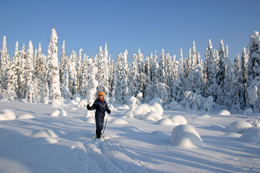
© Ari Meriruoko
In a changing climate, it is increasingly important to evaluate and monitor changes, even at local level. The EU's Copernicus service provides information on the daily snow conditions in different regions of Europe. The service generates information on the extent of snow cover, using a method developed by SYKE. This enables authorities in EU countries to prepare for various incidents, such as floods and avalanches, and allows companies to anticipate their own activities.
SYKE also produces information for the service through remote sensing methods, together with the Finnish Meteorological Institute and an Austrian company in the sector. The Copernicus service will be extended from Europe to the entire Northern Hemisphere.
In co-operation:
European Space Agency, European Environment Agency, Finnish Meteorological Institute
Read more:
More specific overall information for decision-makers of climate policy
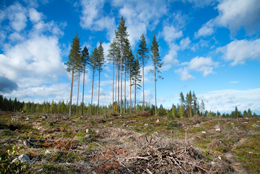
© Riku Lumiaro
International and national climate policy must take more comprehensive account of changes in forests' carbon sinks than at present, in order to achieve the goals of the Paris climate agreement. This is stated in SYKE Policy Brief (2016), which clarified the concepts related to forest carbon balance and facilitated social dialogue between decision-makers, enterprises, researchers and citizens.
The recommendations prepared by SYKE have been utilised both in Finland and in the EU, when discussing the importance of forests and land use in mitigating climate change and when deciding on policy measures.
Read more:
Water accounting encourages water efficiency

© Unsplash
Detailed water accounting prepared together with decision-makers, companies, authorities, researchers and other experts under SYKE’s guidance, explains how much surface and groundwater is being used in Finland for different purposes and how the use of water is divided among the different functions of the national economy.
The description is internationally unique in its precision. It encourages users to save water and supports decision makers in developing controls to promote water-smart circular economy. Accounting-based innovations can also help in finding solutions to global problems of sufficient supply of clean fresh water.
Read more:
Bringing invasive species at sea under control – Finland ratifies ships' ballast water treaty
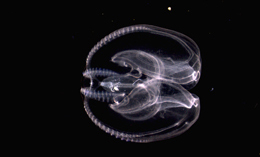
© Maiju Lehtiniemi
Finland made history by ratifying the Ballast Water Management Convention of the International Maritime Organisation in the autumn of 2016. As a result of this, the convention is taking effect globally. The convention makes it more difficult for harmful invasive species to spread through the ballast water of ships.
For the convention, SYKE produced information on invasive species in the Baltic Sea, the routes along which they spread, and on ways to fight them. With its expertise on the marine environment, SYKE also prepared legislation. International research cooperation has supported the production of information on invasive species.
Read more:
Tools for decision-makers to safeguard biodiversity
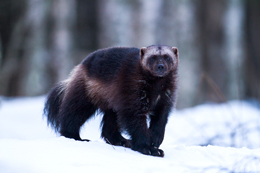
© Markus Sirkka
Deterioration in the threat status of habitat types and species is a key indicator of whether we can halt the loss of biodiversity that is threatening the globe. Assessments of threat status, coordinated by SYKE, have helped to reform legislation facilitating a more effective deceleration in the decline in biodiversity.
The assessment results have also influenced the planning of land use and the targeting of nature management and conservation. This has enhanced the protection of sites such as forest habitats, mires in their natural state, and threatened species and their habitats. Finland is an internationally recognised pioneer in assessing threat status.
Read more:
Effective methods for decision-makers in adapting to climate change
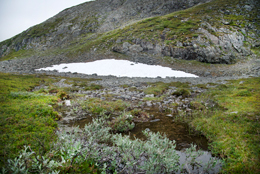
© Riku Lumiaro
New tools are needed for adapting to climate change and safeguarding nature in a changing climate. SYKE and its partners have studied the effects of climate change on different groups of organisms, such as birds, butterflies and moths, and vascular plants. Based on the studies, Finland's National Strategy for Adaptation to Climate Change has been improved and enhanced to respond more effectively to future changes. It has been found that the network of protected areas alleviates the adverse effects of climate change on the occurrence of species.
In co-operation:
Finnish Meteorological Institute, Finnish Museum of Natural History, Natural Resources Institute Finland, Ministry of Agriculture and Forestry, Metsähallitus, Ministry of the Environment (Financier)
Emissions of hazardous substances are being reduced in the Arctic Region
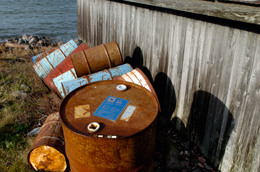
© Riku Lumiaro
Chemicals pose significant risks in the Arctic Region, where the environment is rapidly transforming due to climate change. SYKE has long been coordinating a number of international Arctic Council projects, thereby seeking solutions to the problems caused by emissions of hazardous substances. The greatest potential for reducing emissions lies in Russia, where the risks posed by old pesticides and other hazardous waste, industrial plants and landfills have been reduced in cooperation with local authorities.
Read more:
Addressing climate impacts of housing and construction

© Olli-Pekka Pietiläinen
For the preparation of the Finnish Government’s energy and climate strategy, methods developed by SYKE were used to assess energy consumption and emissions. Up to 80% of greenhouse gas emissions causing global warming originate from the production and consumption of energy. The energy consumption of buildings requires quick measures to reduce emissions. Buildings make up a quarter of all energy consumption.
The operational models developed by SYKE were also used to raise citizens’ awareness on the climate effects of peoples’ homes and everyday lives.
In co-operation:
Tampere University of Technology, Ministry of the Environment
Read more: